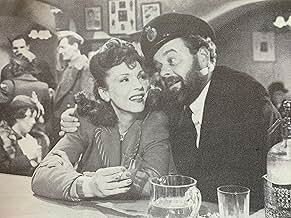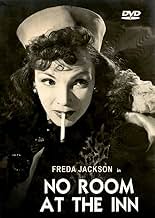Duas crianças são evacuadas durante a Segunda Guerra Mundial e colocadas sob os "cuidados" de uma mulher alcoólica.Duas crianças são evacuadas durante a Segunda Guerra Mundial e colocadas sob os "cuidados" de uma mulher alcoólica.Duas crianças são evacuadas durante a Segunda Guerra Mundial e colocadas sob os "cuidados" de uma mulher alcoólica.
- Direção
- Roteiristas
- Artistas
Marie Ault
- Vicar's Maid
- (não creditado)
Vera Bogetti
- Barmaid
- (não creditado)
- Direção
- Roteiristas
- Elenco e equipe completos
- Produção, bilheteria e muito mais no IMDbPro
Avaliações em destaque
I saw this film years ago as a child and it stuck in my memory, so when it appeared on TV on the Talking Pictures channel, I watched it again. Of course some of the acting is over the top, tipping into caricature. But the children are brilliant. Joan Dowling steals the film and it is sad that she committed suicide in the early fifties, as she had so much to give. An aunt had tales to tell of similar experiences as an evacuee and there is a moral to the film as the do gooders turn a blind eye when asked to help. The denouement is a bit mellow dramatic and the film ends suddenly which is a bit odd, especially as the story is told in flashback, one of the children as an adult is recounting it. We needed a bit more of the scenes from the beginning revisited at the end. Still I enjoyed seeing it again.
Sonia Dresdel had recently played a monstrous matriarch in 'This Was a Woman', now it was Freda Jackson preserving for posterity her performance in Joan Temple's West End hit of 1945 in a role that would have been perfect for Tod Slaughter had he fitted her furs and high heels.
Anybody curious as to what Mrs Bates in 'Psycho' was like before she took strychnine need look no further. Jackson as the monstrous Mrs Voray (we never learn what became of her husband) looks like a female version of The Childcatcher from 'Chitty Chitty Bang Bang', and one of her victims is even called Norma Bates in this barnstorming melodrama that reveals what a fearsome place wartime Britain actually was.
Anybody curious as to what Mrs Bates in 'Psycho' was like before she took strychnine need look no further. Jackson as the monstrous Mrs Voray (we never learn what became of her husband) looks like a female version of The Childcatcher from 'Chitty Chitty Bang Bang', and one of her victims is even called Norma Bates in this barnstorming melodrama that reveals what a fearsome place wartime Britain actually was.
From the opening shot of a department store, with a background choir singing "Once in Royal David's City," this turns out to be an engrossing, evocative & still-powerful film, which has much merit in the message it portrays. Although it dates from 1948, and I have only seen the truncated version of 63 minutes (does anyone have the full version available?) the film is a credit to all concerned. It carries a direct and hard hitting message, and the influence of the great Dylan Thomas is clear for all to see. The casting is top notch, and Freda Jackson plays a thoroughly despicable, two-faced harridan in grand style. In its day, it must have been a forceful, and probably unpalatable, slice of life, with the exposure of dual standards particularly unsettling in certain quarters. Although a work of fiction, it comes across as very true to life and totally believable. It's a must-see film!
When I saw the film the first time I was scared out of my wits by Mrs Voray. I could empathize with evacuee children as some of them came to my town at the end of the war. The film can be viewed in full length on the Internet these days. As an adult I interpret the film as the interplay of myth and social realism. Mrs Voray has the attributes of a witch even in her looks but more significantly in her power to bewitch town worthies and others by her smarmy insinuations and false charm. I agree with another reviewer that the film recalls the world of the Grimm brothers, Hansel and Gretel particularly. Dylan Thomas was intrigued by images drawn from the world of witches and sinister occult practices. What saves the play from being a moralizing allegory is its keen almost Dickensian observation of people as they are, foibles and all.
A full-blooded post-War British melodrama set during World War 2, adapted from a stage play, co-scripted by Dylan Thomas and directed by Daniel Birt (see also THE THREE WEIRD SISTERS) and starring hatchet-faced Freda Jackson as wicked landlady Mrs Voray who takes in orphaned children and spends their allowance on drink and finery. Narrated in flashback by Mary O'Rane (Ann Stephens) as she recalls the experiences that turned both her and fellow orphan Norma Bates (get that name!), played by feisty Joan Dowling, into petty thieves, this has apparently been considerably opened out by co-scripter Thomas, to take in a less than thinly veiled attack on Church and State, as well as the kind of class hypocrisy that allowed middle-class types to tut-tut behind their net curtains at the dirty-faced urchins and carousing working-class slatterns, whilst simultaneously cooking up barely credible excuses not to take the hapless youngsters in; even when begged by a selfless and community-spirited young schoolmistress. Described at the time by 'Today's Cinema' as a '...completely sordid canvas...' and a work of '...cruelty which has no parallel on British screens...', this was clearly strong meat in its day and, even though time has dimmed much of its initial power and rendered some of its sentiment a shade sugary, its theatrics a trifle hammy and its portentous religious overtones somewhat trite and banal, this is still an undeniably downbeat tale of often almost Victorian squalor. Partially leavened by occasional shafts of wit (e.g. Voray recalls her ex-husband 'Nobody bothered about his family tree - except the dogs'), humorous comic stereotypes and sharp-tongued kids, this still packs a fair wallop; thanks in no small measure to Jackson's vividly etched turn as the kind of vicious and spiteful harridan who appears to have stepped out of a tale by the Brothers Grimm. Definitely worth a look for those interested in the often overblown, but nevertheless entertaining, school of post-War British genre cinema.
Principais escolhas
Faça login para avaliar e ver a lista de recomendações personalizadas
Detalhes
- Data de lançamento
- País de origem
- Idioma
- Também conhecido como
- Cendrillon du faubourg
- Locações de filme
- Empresa de produção
- Consulte mais créditos da empresa na IMDbPro
- Tempo de duração
- 1 h 22 min(82 min)
- Cor
- Proporção
- 1.37 : 1
Contribua para esta página
Sugerir uma alteração ou adicionar conteúdo ausente



















